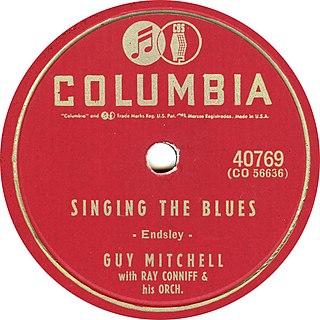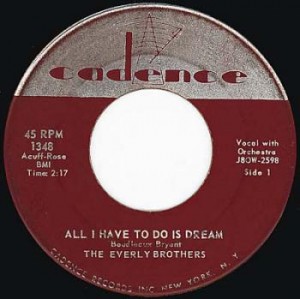
Guinness World Records, known from its inception in 1955 until 1999 as The Guinness Book of Records and in previous United States editions as The Guinness Book of World Records, is a reference book published annually, listing world records both of human achievements and the extremes of the natural world. The brainchild of Sir Hugh Beaver, the book was co-founded by twin brothers Norris and Ross McWhirter in Fleet Street, London, in August 1954.

Gerry and the Pacemakers were a British beat group prominent in the 1960s Merseybeat scene. In common with The Beatles, they came from Liverpool, were managed by Brian Epstein, and were recorded by George Martin.

Manfred Mann was an English rock band, formed in London and lasting from 1962 to 1969. The group was named after their keyboardist Manfred Mann, who later led the successful 1970s group Manfred Mann's Earth Band. The band had two different lead vocalists, Paul Jones from 1962 to 1966, and Mike d'Abo from 1966 to 1969.
British Hit Singles & Albums was a music reference book originally published in the United Kingdom by the publishing arm of the Guinness breweries, Guinness Superlatives. Later editions were published by HiT Entertainment. It listed all the singles and albums featured in the Top 75 pop charts in the UK. In 2004 the book became an amalgamation of two earlier Guinness publications, originally known as British Hit Singles and British Hit Albums. The publication of this amalgamation ceased in 2006, with Guinness World Records being sold to The Jim Pattison Group, owner of Ripley's Believe It or Not!. At this point, the Official UK Charts Company teamed up with Random House/Ebury Publishing to release a new version of the book under the Virgin Books brand. Entitled The Virgin Book of British Hit Singles, it was first published in November 2008 with a separate albums book and second edition being published over the next couple of years.
"Hernando's Hideaway" is a tango show tune, largely in long metre, from the musical The Pajama Game, written by Jerry Ross and Richard Adler and published in 1954. It was sung in the stage and film versions of the musical by Carol Haney. The song is about a fictional invitation-only nightclub of the same name where lovers can meet for secret rendezvous. In the few years after the song's release, a number of artists had hit recordings of it, including Archie Bleyer, Johnnie Ray and The Johnston Brothers.

"Singing the Blues" is a popular song written by Melvin Endsley and published in 1956. The song was first recorded and released by Marty Robbins in 1956. It is not related to the 1920 jazz song "Singin' the Blues" recorded by Frank Trumbauer and Bix Beiderbecke in 1927.
Paul Masterson is a Northern Irish DJ and record producer, originally from Belfast and now living in London. He is best known for recording as Yomanda.

"All I Have to Do Is Dream" is a song made famous by the Everly Brothers, written by Boudleaux Bryant of the husband-and-wife songwriting team Felice and Boudleaux Bryant, and published in 1958. The song is ranked No. 141 on the Rolling Stone magazine's list of The 500 Greatest Songs of All Time. The song is in AABA form.
Roger Kitter was an English actor and impressionist, best known for playing Captain Alberto Bertorelli in series 7 of the British sitcom TV series 'Allo 'Allo!. He had previously appeared weekly with Lulu throughout the 10-week run of her 1973 BBC1 series It's Lulu and was a regular on the ITV show Who Do You Do?. With Kaplan Kaye he also recorded a song "Chalk Dust - The Umpire Strikes Back" using the monicker "The Brat". Released on the Hansa label, it entered the UK Singles Chart on 10 July 1982; it reached a peak of number 19, and remained in the chart for 8 weeks. The song was a Top 10 hit in the Netherlands, Belgium and South Africa, and lampooned John McEnroe complaining about line calls in tennis. He also provided the voice of Tommy Cooper in the Lego "Kipper" advertisement.

"Do You Love Me" is a rhythm and blues song recorded by the Contours in 1962. Written and produced by Motown Records owner Berry Gordy Jr., it appeared twice on the Billboard Hot 100 chart, reaching numbers three in 1962 and eleven in 1988.

"Get Off of My Cloud" is a song by the English rock band the Rolling Stones. It was written by Mick Jagger and Keith Richards for a single to follow the successful "(I Can't Get No) Satisfaction". Recorded in Hollywood, California, in early September 1965, the song was released in September in the United States and October in the United Kingdom. It topped the charts in the US, UK, Canada, and Germany and reached number two in several other countries.
Timothy E. Thomas is an American R&B singer, keyboardist, songwriter and record producer, best known for the hit song, "Why Can't We Live Together".

"Rock-a-Hula Baby ("Twist" Special)" is a 1961 song recorded by Elvis Presley and performed in the 1961 film Blue Hawaii. The song was also released as a single.

"Rose Marie" is a popular song from the musical or operetta of the same name. The music was written by Rudolf Friml and Herbert Stothart, the lyrics by Otto Harbach and Oscar Hammerstein II, In the original Broadway production in 1924, the song was performed by Dennis King and Arthur Deagon, as the characters Jim Kenyon and Sergeant Malone.

"I Like It" is the second single by Liverpudlian band Gerry and the Pacemakers. Like Gerry Marsden's first number one "How Do You Do It", it was written by Mitch Murray. The song reached number one in the UK Singles Chart on 20 June 1963, where it stayed for four weeks. It reached No. 17 in the American charts in 1964.
The Addrisi Brothers were an American pop duo from Winthrop, Massachusetts. The brothers themselves were Donald "Don" Addrisi and Richard "Dick" Addrisi.

The Virgin Book of British Hit Singles is a charts reference book published in October 2008. It replaces the Guinness Book of British Hit Singles & Albums, after the Guinness World Records brand was sold to The Jim Pattison Group, who decided that UK chart books were not a core part of their new global acquisition. The last edition was published by Guinness World Records in 2006 and covered all chart hits between 1952-2005. Two years later Ebury Publishing/Random House took over the contract from The Official Charts Company to publish the re-branded version of the book under their Virgin Books brand. Published as The Virgin Book of British Hit Singles in November 2008 without the album charts information, but with the data pertaining to the EP chart, published between March 1960 and December 1967. The Virgin Book of British Hit Singles was last updated in 2010 with Volume 2 being edited by Dave McAleer, Andy Gregory and Matthew White.
"We're Gonna Do It Again" was a single released on 1 May 1995 by the English football team Manchester United for the 1995 FA Cup Final. It reached number 15 in the UK Singles Chart.











